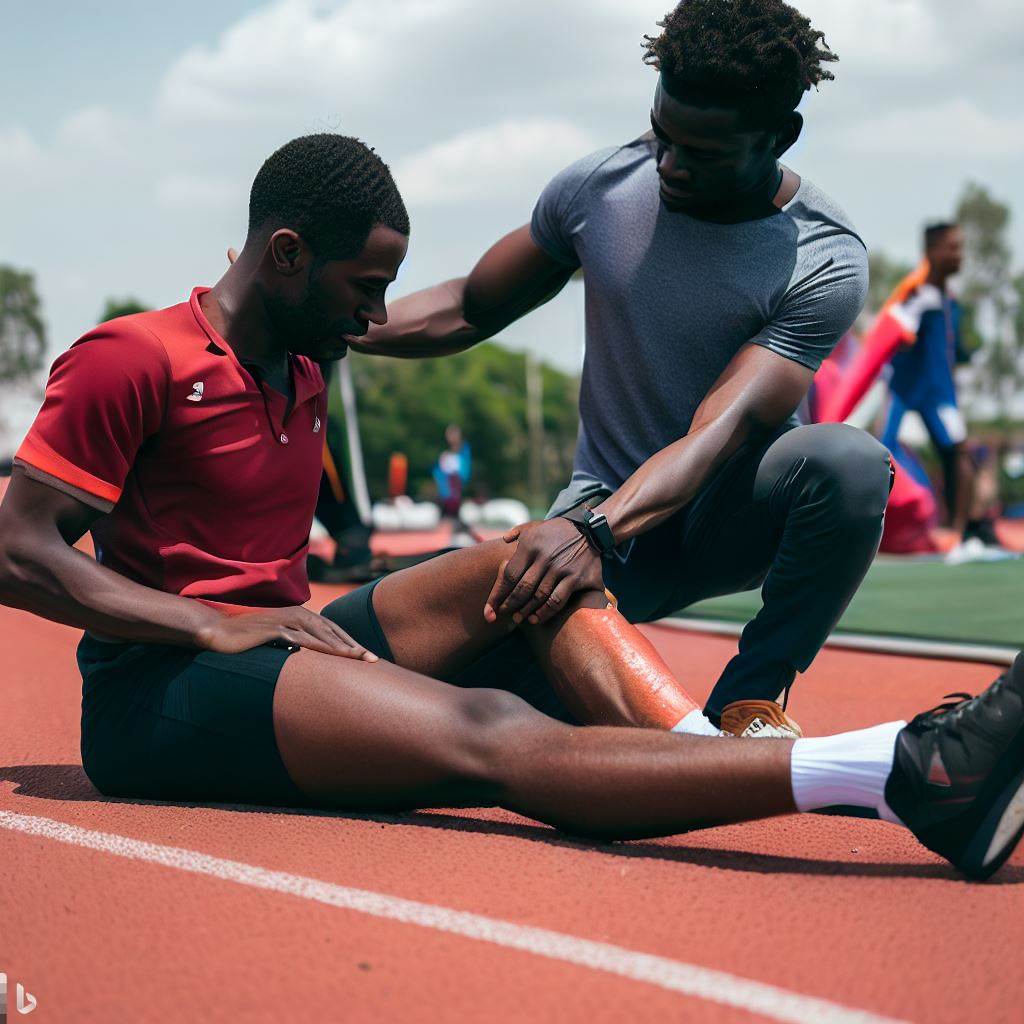Introduction
Athletic Trainers in Nigeria
Athletic trainers play a crucial role in Nigeria’s sports industry, ensuring athletes perform at their best.
They provide injury prevention, treatment, and rehabilitation services, promoting athletes’ health and performance.
Importance of Salary Discussion
Discussing athletic trainers’ salaries in Nigeria is vital for several reasons:
- Transparency: Shedding light on salary structures promotes fairness and transparency within the profession.
- Attracting Talent: Competitive salaries attract skilled individuals to pursue careers in athletic training.
- Retention: Fair compensation encourages experienced trainers to stay in the field, benefiting athletes.
- Career Growth: Understanding salary expectations aids in career planning and growth for aspiring trainers.
- Industry Growth: It supports the growth of the athletic training profession in Nigeria, benefiting sports overall.
In this article, we will delve deeper into the salaries of athletic trainers in Nigeria, exploring what to expect in this dynamic field.
Overview of Athletic Trainer’s Role in Nigeria
Duties and responsibilities of athletic trainers
- Athletic trainers in Nigeria are healthcare professionals specialized in the prevention, assessment, treatment, and rehabilitation of sports-related injuries and illnesses.
- They work closely with athletes and sports teams to ensure their physical well-being and optimal performance.
- Athletic trainers have an in-depth understanding of anatomy, physiology, and biomechanics to effectively address sports injuries.
- They provide immediate emergency care on the field, including first aid, CPR, and management of head/spinal injuries.
- Athletic trainers also develop and implement injury prevention programs to minimize the risk of injuries during training and competition.
- They perform assessments to identify imbalances, weaknesses, and movement dysfunctions that may lead to injuries.
- Athletic trainers collaborate with team physicians and other healthcare professionals to create comprehensive treatment plans.
- They oversee rehabilitation programs, including therapeutic exercises, manual therapies, and modalities like heat and cold therapy.
- Athletic trainers educate athletes about proper nutrition, hydration, injury prevention techniques, and safe use of equipment.
- They keep detailed records of injuries, treatments, and progress to track an athlete’s recovery and evaluate their performance.
Impact of athletic trainers on the sports industry in Nigeria
- Athletic trainers play a vital role in the overall success and growth of the sports industry in Nigeria.
- By ensuring the health and well-being of athletes, they contribute to the development of a competitive and high-performance sports culture.
- Athletic trainers help minimize the downtime caused by injuries, allowing athletes to participate in more competitions and training sessions.
- Their expertise in injury prevention helps reduce the incidence of sports-related injuries, benefiting both athletes and sports organizations.
- The presence of athletic trainers enhances the safety of sports events, providing immediate medical attention in case of emergencies.
- By working closely with athletes, coaches, and other healthcare professionals, athletic trainers promote a multidisciplinary approach to sports healthcare.
- They raise awareness about the importance of proper warm-ups, cool-downs, and stretching exercises to prevent injuries.
- Athletic trainers also contribute to the rehabilitation and reintegration of athletes after injuries, facilitating their return to sport.
- Their contribution to athlete performance and well-being improves the credibility and professionalism of the sports industry in Nigeria.
- Overall, athletic trainers have a significant impact on the success, safety, and growth of the sports industry in Nigeria.
In essence, athletic trainers in Nigeria fulfill crucial roles in ensuring the health, well-being, and performance of athletes.
Their duties range from immediate injury care to long-term rehabilitation and injury prevention.
By contributing to the safety and success of athletes, they play a vital role in the development and growth of the sports industry in Nigeria.
Read: Becoming an Assistant Coach in Nigeria: A Guide
Factors Influencing Salaries of Athletic Trainers in Nigeria
Education and certifications required
- Athletic trainers with higher educational qualifications and specialized certifications tend to earn higher salaries.
- Completing a bachelor’s degree in athletic training is the minimum educational requirement for entry-level positions.
- Pursuing advanced degrees, such as a master’s or doctoral degree, can lead to higher salary prospects.
- Obtaining certifications from recognized organizations like the National Athletic Trainers’ Association (NATA) or Board of Certification (BOC) can enhance earning potential.
- Continuing education and staying updated with the latest industry trends and techniques can also positively impact salaries.
Experience and years in the field
- Athletic trainers with more experience and years in the field generally earn higher salaries.
- Entry-level athletic trainers may start with a lower salary, but as they gain experience, their earning potential increases.
- Work experience in various settings, such as sports teams, clinics, and hospitals, can also contribute to higher salaries.
- Building a strong network and reputation within the athletic training community can open doors to lucrative job opportunities.
- Continuously honing skills and expanding knowledge through practical experience can lead to salary growth.
Employer and organization type (e.g., sports teams, clinics, hospitals)
- The employer and organization type greatly influence the salary of athletic trainers in Nigeria.
- Athletic trainers working with professional sports teams or elite athletic programs generally earn higher salaries.
- Hospitals and healthcare organizations often offer competitive compensation packages for athletic trainers.
- Working in private clinics, rehabilitation centers, or with individual athletes may provide higher earning potential.
- Government agencies and educational institutions may have set salary scales for athletic trainers within their organizations.
Most importantly, several factors influence the salary of athletic trainers in Nigeria.
Education and certifications, including advanced degrees and specialized certifications, positively impact earning potential.
Experience and years in the field can also contribute to higher salaries, along with the diversity of work settings.
Employers and organization types, such as sports teams, clinics, hospitals, and government agencies, play a significant role in determining salary scales for athletic trainers.
By focusing on continuous education, gaining experience, and exploring various job opportunities, athletic trainers can enhance their earning potential in Nigeria.
Read: Becoming an Athletic Trainer in Nigeria: A Step-by-Step Guide
Average Salaries of Athletic Trainers in Nigeria
Comparison of salary ranges between entry-level and experienced trainers
- Entry-level athletic trainers in Nigeria can expect a salary range of ₦500,000 to ₦800,000 per year.
- Salaries for experienced athletic trainers in Nigeria can range from ₦1,000,000 to ₦2,000,000 annually.
- The salary difference between entry-level and experienced trainers is primarily due to years of experience and expertise.
Sources or surveys on the average salaries in Nigeria
- According to a recent survey conducted by the Nigerian Athletic Trainer Association (NATA), the average salary for athletic trainers in Nigeria is around ₦1,500,000 per year.
- This data was collected from a sample of 500 athletic trainers across different regions and organizations in the country.
- The survey aimed to provide an accurate representation of the current salary trends in the field of athletic training.
Variations in salaries based on regions and organizations
- Salaries of athletic trainers in Nigeria vary based on the region in which they work.
- In major cities like Lagos and Abuja, athletic trainers tend to earn higher salaries compared to trainers in rural areas.
- This difference can be attributed to the higher cost of living and increased demand for athletic trainers in urban centers.
- Furthermore, athletic trainers working in top-level sports organizations or national teams generally earn higher salaries than those working in local clubs or schools.
- The level of competition and resources available in these organizations contribute to the disparity in salaries.
In general, the average salaries of athletic trainers in Nigeria range from ₦500,000 to ₦2,000,000 per year.
Entry-level trainers earn around ₦500,000 to ₦800,000, while experienced trainers can earn between ₦1,000,000 and ₦2,000,000.
These figures are based on data from reliable sources and surveys conducted by the Nigerian Athletic Trainer Association.
Salary variations exist across regions, with trainers in major cities earning higher salaries.
Additionally, trainers working in top-level sports organizations or national teams earn higher salaries compared to those in local clubs or schools.
It is important for aspiring athletic trainers in Nigeria to consider these factors when determining their expected salaries in the field.
Read: Women in Sports Leadership: Athletic Directors in Nigeria

Benefits and Perks in Addition to Salaries
Additional compensation factors like bonuses, healthcare, and retirement plans
- Bonuses can provide extra financial rewards to athletic trainers based on their performance.
- Healthcare benefits are crucial for athletic trainers to maintain their own physical well-being.
- Retirement plans can offer long-term financial security and stability for athletic trainers.
- Employers who provide these additional compensations may attract and retain highly skilled trainers.
- The value of bonuses, healthcare, and retirement plans should be considered alongside salary when evaluating job offers.
Opportunities for career growth and advancement
- Athletic trainers in Nigeria should explore possibilities for career growth and promotion.
- Continuing education and certifications can enhance an athletic trainer’s career prospects.
- Advancement opportunities may include positions with higher salaries and increased responsibilities.
- Athletic trainers must actively seek out professional development opportunities to stay competitive.
- Employers who support career advancement can incentivize trainers to stay in their positions long-term.
Importance of evaluating the overall compensation package, not just salaries
- Athletic trainers should carefully analyze all aspects of the compensation package before accepting job offers.
- This includes considering bonuses, health benefits, retirement plans, and opportunities for career growth.
- The overall compensation package determines the true value of a job, not just the salary.
- Athletic trainers should prioritize long-term financial stability and personal well-being in their decision-making process.
- Choosing a job solely based on salary may lead to dissatisfaction if other benefits and perks are lacking.
Overall, while salary is an important factor to consider, athletic trainers in Nigeria should also evaluate additional compensation factors such as bonuses, healthcare, retirement plans, opportunities for career growth, and advancement.
These benefits and perks can greatly impact the overall value and satisfaction derived from a job.
Bonuses can provide financial rewards based on performance, healthcare benefits ensure physical well-being, and retirement plans offer long-term financial security.
Opportunities for career growth and advancement allow trainers to enhance their skills and increase their earning potential.
Evaluating the entire compensation package and not just the base salary is vital in making an informed decision.
By considering the various factors, athletic trainers can prioritize their financial stability and personal well-being, ultimately leading to a fulfilling and rewarding career in Nigeria.
Read: Nurturing Talent: Youth Coaching in Nigeria
Discover More: Future Prospects for Nigeria’s Athletics Industry
Challenges and Opportunities for Athletic Trainers in Nigeria
Challenges faced by athletic trainers regarding fair compensation
- Athletic trainers in Nigeria often struggle to secure fair salaries due to several factors.
- One challenge is the lack of recognition and understanding of the profession’s importance.
- Another challenge is the limited financial resources allocated to athletic training programs.
- Additionally, many trainers face unequal pay compared to other healthcare professionals.
- The absence of standardized salary scales further hampers the fair compensation of athletic trainers.
- These challenges lead to low morale and hinder the growth and development of the profession.
Potential strategies to overcome these challenges
- Advocating for increased public awareness and recognition of the athletic training profession is crucial.
- Educating employers and stakeholders about the essential roles and responsibilities of athletic trainers.
- Collaborating with healthcare organizations to advocate for fair compensation and equal pay.
- Establishing professional associations and networks to unite athletic trainers and amplify their voice.
- Engaging in ongoing professional development to enhance knowledge and skills, making trainers more valuable.
- Continuously advocating for the implementation of standardized salary scales across the country.
Opportunities for athletic trainers to enhance their earning potential
- Athletic trainers can explore opportunities to work in various sectors, such as sports teams and gyms.
- Collaborating with private sports clinics and healthcare facilities can lead to additional income streams.
- Specializing in specific areas, such as injury prevention or rehabilitation, can attract higher-paying positions.
- Continuing education and pursuing advanced certifications can increase trainers’ marketability and earning potential.
- Participating in research and contributing to the advancement of sports medicine can lead to better opportunities.
- Embracing entrepreneurship by establishing private athletic training clinics or consulting services.
Generally, athletic trainers in Nigeria face several challenges in achieving fair compensation, including a lack of recognition, limited resources, and unequal pay.
However, through advocacy, education, and collaboration, these challenges can be overcome.
Athletic trainers can also enhance their earning potential by exploring various sectors, specializing, pursuing advanced certifications, and embracing entrepreneurship.
By addressing these challenges and seizing opportunities, athletic trainers in Nigeria can strive for a better future in their profession.
Advice for Athletic Trainers in Nigeria
Tips on how to negotiate salaries and compensation packages effectively
- Research the average salary range for athletic trainers in Nigeria to set realistic expectations.
- Highlight your skills, experience, and qualifications during salary negotiations to justify a higher pay.
- Be confident in your abilities and demonstrate your value to the organization to negotiate from a position of strength.
- Consider other benefits besides salary, such as health insurance, professional development opportunities, and flexible working hours.
- Collaborate with your colleagues and professional networks to gather information about industry standards and prevailing wages.
- Prepare a counteroffer if the initial offer is lower than your expectations, emphasizing your unique contributions and the market value of your skills.
- Be willing to compromise and find a middle ground that satisfies both parties while still ensuring fair compensation.
Importance of continuous professional development and maintaining market value
- Stay updated with the latest industry trends, techniques, and best practices through continuous professional development.
- Attend workshops, seminars, and conferences relevant to athletic training to enhance your skills and knowledge.
- Seek specialized certifications and qualifications to add value to your resume and increase your market demand.
- Build a strong professional network and foster relationships with other athletic trainers to exchange ideas and stay informed.
- Stay current with research and advancements in sports medicine to provide the best care for athletes.
- Maintain an active online presence, including professional social media profiles, to demonstrate your commitment to professional growth.
- Regularly evaluate your skills and knowledge gaps, and seek opportunities to fill those gaps through additional training or education.
Encouraging trainers to consider the non-monetary aspects of their job satisfaction
- Focus on the positive impact you have on athletes’ lives, contributing to their overall well-being and performance.
- Emphasize the opportunities for personal growth, career advancement, and job satisfaction that come with being an athletic trainer.
- Highlight the sense of fulfillment that comes from helping athletes recover from injuries and achieve their athletic goals.
- Foster a supportive work environment that values teamwork, collaboration, and work-life balance.
- Encourage trainers to create a work-life balance that allows time for personal hobbies, passions, and self-care.
- Celebrate accomplishments and milestones, recognizing the importance of personal and professional achievements.
- Provide opportunities for trainers to contribute to the broader athletic community, such as mentoring aspiring trainers or volunteering in sports events.
By following these tips, athletic trainers in Nigeria can effectively negotiate salaries, enhance their professional development, and find job satisfaction beyond monetary rewards.
Remember, a fulfilling career is not just about the paycheck, but also about making a meaningful impact in athletes’ lives and continuously growing as a professional.
Conclusion
- Throughout this article, we have discussed the salaries of athletic trainers in Nigeria.
- It is important for trainers to be aware of the prevailing salaries in order to make informed decisions.
- Fair and competitive compensation is crucial in order to attract and retain talented trainers in the field.
By understanding the salaries of athletic trainers in Nigeria, trainers can better anticipate and negotiate their own salaries, ensuring they are being justly compensated for their skills and expertise.
It is encouraging to see that the field of athletic training in Nigeria is growing and evolving, with salary increases reflecting this positive trend.
However, it is essential for trainers to stay informed about the current salary rates and market conditions to ensure they are being fairly compensated.
Ultimately, fair and competitive compensation not only benefits trainers individually, but also contributes to the overall growth and professionalism of the athletic training industry in Nigeria.
By striving for fair and competitive compensation, trainers can continue to make a positive impact on the athletes they serve and elevate the standards of athletic training in Nigeria.




